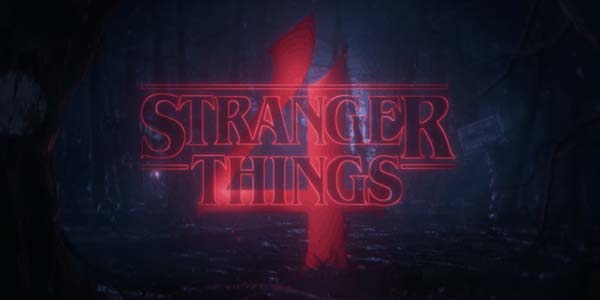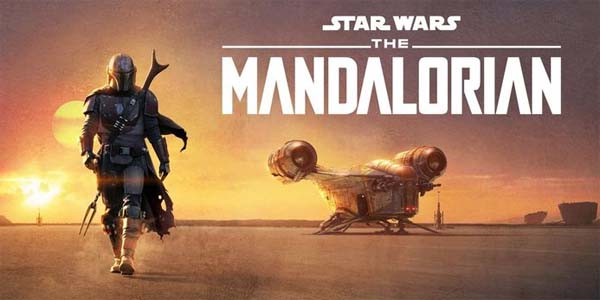
I never bothered reviewing the 3rd season of Stranger Things because I didn't really have strong feelings about it one way or the other. Season 3 was a bit of an improvement over season 2, but both were a resounding "meh" for me. The first half of season 4 is also kind of "meh", but I think that it's worth talking about this time around because it both succeeds tremendously where seasons 2 and 3 failed, but also then kind of ruins any goodwill that it had built up.
The fundamental problem that I have with Stranger Things after the first season is that a continuation of this same story simply doesn't need to happen. The first season worked so well, in large part, because of its intriguing mysteries. Aside from sequel bait, all the important questions and mysteries of season 1 were solved, and the first season felt satisfactorily resolved. If this show was going to have sequel seasons, then I think a more anthology-like approach would have been more appropriate, with each new season telling a new story, with new characters, confronting a completely new and unrelated horror, and solving completely new and unrelated mysteries.
By continuing with the same story, the audience gets to bring everything we know from the first season into the new story. Even though seasons 2 and 3 went in their own directions and took different inspirations compared to the first season (season 1 being kind of Twin Peaks meets E.T., season 2 being inspired by Aliens and Terminator, and season 3 being a play on a Body-Snatchers concepts), neither season 2 nor 3 introduced anything tremendously new. There wasn't much mystery because the workings of the Upside Down, the mechanics of the demogorgons, and the machinations of the secret government labs were all established. Season 3 shakes things up a bit with a body-snatchers plot and an ending that actually destroys the status quo and moves our characters forward with their lives, and is perhaps the only reason that season 3 did not feel quite as stale (for me) as season 2 did. But the fundamental problem was still the same: we've seen all this before, more or less.
Season 4's "monster of the week" approach feels fresh and new.
This is where season 4 kind of shines. It's new monster, Vecna, isn't just another demogorgon. He's something that feels completely new and threatening. His motivations are unknown, and despite being explicitly inspired by Freddy Krueger, the mechanics by which he operates are completely new compared to the previous monsters. This finally gives our characters an actual mystery to solve. For the first time since season 1, the threat of Stranger Things is finally mysterious and unknown again. [More]
So what the heck happened to Picard's dog?! Number One was my favorite character in the premiere, but then he completely disappeared from the entire rest of the show and hasn't even been mentioned since. Were his inclusions in the premiere nothing more than reshoots that were thrown in at the last minute, after much of the rest of the show had been scripted and filmed?
Picard's home was broken into and Picard physically assaulted. The dog was nowhere to be seen. Guess he's not much of a guard dog, huh? I don't even think Picard bothered to ask if Number One was alive after the attack. For all he knew, the Romulan assassins murdered his dog. There's also no tearful "good bye" when Picard has to leave the planet on a potentially dangerous mission, or talk of who might take care of the dog if Picard doesn't return. On the upside, at least the writers didn't kill the dog as an excuse to turn Picard into "space John Wick", in the same fashion that the TNG movies used Picard as a "space John McClane".
Then again, bringing up an idea or character, only to completely drop it by the end of an episode with no real exploration of the concept or character seems to be the modus operandi of Star Trek: Picard.
I gave a lot of leeway to the premiere. I even said that I want to "delight of having just watched a new piece of Star Trek media that I didn't hate". Well that lack of hatred didn't last long. Each episode of Picard just got progressively worse and worse.
If not for the fact that I intended to write a full season review, I would have stopped watching the show by episode 4.
What happened to Picard's dog, Number One? He just disappears from the show after the first episode!
Just as I feared, Star Trek; Picard isn't about the rights of androids or the moral imperative to provide humanitarian relief to refugees (whether those refugees happen to be Romulans or ex-Borg). These things are dominant themes, but they aren't what the plot or story is actually about, nor does it ever become the ultimate message of the show. I think the overall message was supposed to be to not let your fear and prejudice turn you into a genocidal monster, but even that happens in a lazy, eleventh-hour "twist" that I thought made no sense. The actual plot is about conspiracies to cover up the existence of robot Lovecraft monsters from another dimension, and to stop androids from inevitably summoning them to kill all humans. Yep, that's Star Trek canon now. Go figure...

In the meantime, the episode-by-episode (and minute-to-minute) scripting is trying too hard to be like Firefly or any other grungy sci-fi series from the past 20 years. Now, I love Firefly. I also praise The Mandalorian for taking cues from Firefly. But The Mandalorian is set in the Star Wars universe, which was always a grungy universe that contained lovable rogues and scrappy survivors. Star Trek has never been that kind of universe. It's the antithesis of that kind of universe. If I wanted to watch a dark and gritty cowboy / ronin space adventure, then I'll watch The Mandalorian, or I'll go back and watch Firefly or Battlestar Galactica again. Or I'll check out The Expanse or Dark Matter or Altered Carbon or Westworld, or any one of a dozen other sci fi shows that have come and gone in the past 20 years and have borrowed heavily from that same aesthetic. Or I'll play Mass Effect 3, which Picard seems to have blatantly plagerized.
I don't watch Star Trek for that. I watch Star Trek for thought-out, uplifting, cerebral science fiction about an optimistic future that I hope humanity eventually achieves.
... [More]
22e79e8f-9802-45a0-a54d-d7ce9a53f717|2|5.0
Tags:Star Trek, Star Trek: Picard, Jean-Luc Picard, CBS, all access, streaming television, Romulan, Borg, Hugh, Seven of Nine, Icheb, android, civil rights, refugee, future, poverty, racism
Having dislocated my shoulder a few weeks ago, I haven't been doing much video gaming. I can do some PC gaming on my laptop using my trackball mouse and wireless keyboard (and plan on having a new Civilization VI strategy published real soon), and I also finally started playing Breath of the Wild on the Switch, since the Switch controller is much more comfortable to use with my arm in a sling. I haven't touched the PS4 since the dislocation. I've also been watching a lot more TV and movies.
One such television show has been Netflix's new The Witcher TV series, based on the novels that inspired the video game series of the same name. The Witcher III is a fantastic game that I've come to adore due to its exceptionally well-written and thoughtful quests. But I never played the first two games in the series, nor read the books. So I was looking forward to the TV show hopefully filling me in on more of the backstory and history of these characters and this world.
I just wish that I was having an easier time following along with what the heck is going on in this show, as its plotting and structure seems to be rather muddled.
I'm not even talking about the large, big-picture structure of the show. I followed along just fine with the show jumping back and forth between Ciri's escape from the Nilfgardian invasion of Cintra, and the travels of Geralt that happened in the 15 or so years leading up that invasion. It took me a few episodes to wrap my head around it, but I'm fine with it.
No, what's confusing me is the minute-to-minute plotting and character motivations. There have been numerous times during these eight episodes that I just kind of threw my hands up and asked aloud "what is going on here?". Why are these characters doing what they are doing? And why do so many conversations feel like they are made up of non sequiturs? There's going to be some light spoilers here, so if you haven't watched the show yet, you can maybe skip the next two or three paragraphs.
I found myself very confused as to why certain things were happening.
... [More]

One of my biggest complaints with Disney's Star Wars movies has been their complete lack of original ideas, and their complete unwillingness to move the Star Wars narrative forward. That's actually why I didn't think The Last Jedi was as bad as most people said it was. I mean, it wasn't "good" by any stretch of the imagination. The script was messy, the tone was uneven, and a lot of the movie's logic was fundamentally flawed. But I appreciated much of the bold thematic elements. The Last Jedi wanted desperately to move the franchise in new directions, and it actively mocked the previous film(s) (and the fanbase) for being too trapped in the past.
The rest of Disney's Star Wars movies haven't been so bold. The Force Awakens was a rehash of the original movie. Rogue One and Solo were both prequels that nobody asked for that both attempted to explain minutia that never needed explaining to begin with. I haven't seen Rise of Skywalker yet, but I'm hearing that it's an exceedingly dumb rehash of Return of the Jedi, and possibly the worst Star Wars movie since The Pantom Menace. And that's the "gentle" criticism that I'm hearing from people who were generally favorable towards Disney's treatment of Star Wars!
Suffice it to say, outside of the X-Wing and Armada tabletop games (which I love and still regularly play), I have become so jaded and sick of Star Wars that I didn't bat an eye at Disney's announcement of The Mandalorian. I just assumed that it was a prequel series about young Boba Fett that would continue the Star Wars trend of fixating on its past. I had no interest in watching the series, and I sure as hell was not going to pay a monthly subscription to Disney to watch it.
But I guess a free subscription to Disney Plus came with our Verizon phone plan, and my girlfriend was hearing some good word-of-mouth in the week after the first episode premiered, so we've been having stay-in date nights to watch it. I want to say, by the way, that I like this approach of releasing episodes of a streaming series on a fixed schedule, rather than dumping a whole season all at once. It facilitates water-cooler talk because everybody else is at the same point in the narrative that you are. You have time to digest the events of each episode and talk about them, and you are able to speculate with friends over what's going to happen next, because your friends don't know either! You'd think that streaming services like Netflix and Hulu would have figured this out with the success of HBO's Game of Thrones weekly release schedule, but they didn't. Disney learned. (and so did CBS).
The Mandalorian feels like it's actually pushing the Star Wars narrative forward.
... [More]
9af949f8-bcdc-48c6-8e4d-0265034ac0cf|1|5.0
Tags:The Mandalorian, Disney, Disney Plus, streaming television, Lucasfilm, Star Wars, Mandalorian, bounty hunter, Yoda, baby Yoda, child, the Force, Galactic Empire, New Republic, Christmas, toy
My biggest concern going into this new Twilight Zone reboot was with the hour-long format of its premiere. The first episode, "The Comedian" (which was available on YouTube for free as a preview of the show to come), was a bit overlong and dragged considerably in the second half. It had made its point by about halfway through, we could all see where the episode was going, and it insisted on going on for another 20 minutes despite not really having anything left to say.
OK, yeah sure, in the past I've complained about shows like Fox's Cosmos reboot being too short. Commercials cutting Niel DeGrasse Tyson's Cosmos reboot to only 45-ish minutes was simply not enough time for Tyson to give more than an elementary overview of the grandeur of nature or science.
However, The Twilight Zone isn't an educational show about "all that is, or ever was, or ever will be"; it's an anthology of science fiction parables and allegories. Parables and allegories are usually short and simple stories intended to convey a moral or lesson or insight into the human condition. The Twilight Zone doesn't really need a full hour to tell its stories. The twists are easy enough to see coming. This isn't The Sixth Sense, or Fight Club, or American Psycho, or Se7en, or something similar that actually needs a two-hour runtime to build up suspense and intrigue and dot the entire runtime with clues for its twist ending.
The pilot episode "The Comedian" felt over-long.
I was happy to see that episodes later in the first season have variable runtimes. The second episode, "Nightmare at 30,000 Feet" (which is actually a totally different story than the "Nightmare at 20,000 Feet" classic that it is homaging with its title), is under 40 minutes, filled out its runtime better, and enjoyed much tighter overall pacing. The following episode, "Replay", clocked in at 45 minutes, and also enjoyed a much tighter script.
... [More]
55a4fecd-3e7f-4cf2-be91-446004c60d06|1|4.0
Tags:The Twilight Zone, Jordan Peele, CBS, all access, streaming television, Rod Serling, science fiction, anthology, parable, allegory, racism, bigotry, toxic masculinity, date rape, social justice, social injustice, plot twist
|

| 12 | | | | | | | 60 | | 11 | | | | | | | 55 | | 10 | | | | | | | 50 | | 09 | | | | | | | 45 | | 08 | | | | | | | 40 | | 07 | | | | | | | 35 | | 06 | | | | | | | 30 | | 05 | | | | | | | 25 | | 04 | | | | | | | 20 | | 03 | | | | | | | 15 | | 02 | | | | | | | 10 | | 01 | | | | | | | 05 |
|